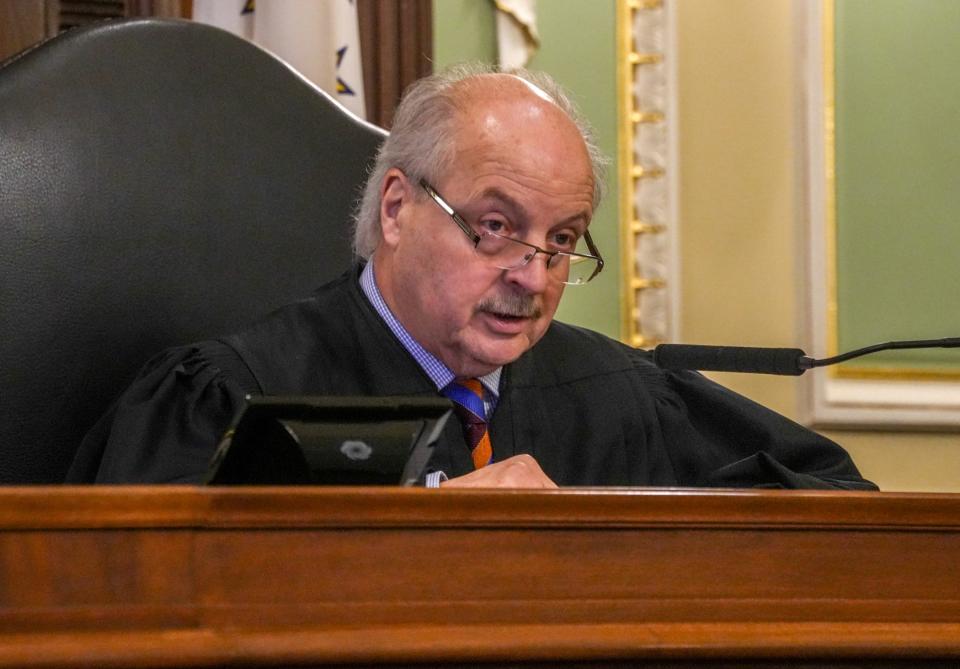AG ordered to court over social media posts. He argues they are his constitutional right.
PROVIDENCE – Attorney General Peter F. Neronha is seeking to vacate a judge’s order that he appear in court next week, arguing that it violates his First Amendment rights and constitutional duties.
Superior Court Judge Daniel A. Procaccini ordered Neronha to court Nov. 10, at the close of the trial of a Barrington dentist accused of assaulting his Muslim neighbor in what the state argued was a racist hate crime. Procaccini acquitted Richard Gordon after a hotly argued two-day trial.
The judge referenced “conduct that this Court is troubled by and feels it needs to address regarding the Attorney General’s Department.”
“First, the Order intrudes on the Attorney General’s constitutional responsibilities to represent the public interest and keep the public apprised as to matters of public policy. Second, it intrudes on the Attorney General’s First Amendment right as a member of the public to comment on public affairs,” Miriam Weizenbaum, chief of the civil division, wrote.
The office faulted the order for failing to specify “any alleged violation of law, policy, or rule” in ordering Neronha to appear Dec. 8.
“Without defining the scope or purpose of the scheduled hearing, the Order risks intruding this core constitutional right by chilling or otherwise sanctioning the Attorney General for expressing his opinion on matters of public concern, including, as here, the work of his office and need to reform Rhode Island’s existing practice on waiving jury trials in criminal cases,” the state argued.
“Calling for reforms and responding to misstatements regarding the work of state prosecutors do not diminish the public’s respect for the legal system or those who serve it, including judges. Judges, in all events, are not immune from public criticism,” the state said.

'Troubled' by conduct
In issuing the order, Procaccini referenced “conduct that this Court is troubled by and feels it needs to address regarding the Attorney General’s Department.”
The judge noted that the order was prompted by an incident that happened two days earlier at 7:30 a.m., apparently in reference to posts Neronha made on social media after closing arguments and as Procaccini was deliberating the case.
“Random thought before 8 am bell rings: in federal system, the prosecution must agree to a jury-waived trial in addition to the defendant. In the state system, only the defendant must agree. That’s a real weakness for our state system – & should be changed. Victims deserve justice too,” Neronha wrote.
Judge Procaccini was presiding over a bench trial in Gordon’s case, meaning there was no jury. Defendants in Rhode Island have the right to opt for bench trials without the agreement of the prosecution under court rules.
“We’re going to try,” Neronha continued in another post, an apparent reference to pushing for changes in the bench-trial system. “When some judges never oversee a jury trial, it’s not a coincidence.”
Many in the legal community viewed the posts as a swipe at Judge Procaccini’s integrity, as he oversees many bench trials and had convicted another defendant after a bench trial that same morning.
The attorney general’s office bolstered its arguments by noting that its research found that 2 of the 24 Superior Court judges preside over 56% of the jury-waived trials.
In Rhode Island, defendants have the option to waive a jury trial without prosecutors’ consent – unlike most states which require the consent of the court, prosecutors or both, the state said.
First Amendment arguments
The office argued that Neronha’s posts were of public importance and fell within court Rules of Professional Conduct governing lawyers.
“[The] public has a `legitimate interest in the conduct of judicial proceedings, particularly in matters of general public concern,’” Weizenbaum wrote. “By sharing information about the work of his office and his views on legal matters, the Attorney General helps promote debate and deliberation over questions of public policy.”
“The Attorney General’s posts were not only a legitimate exercise of his constitutional responsibilities but also of his individual First Amendment right as a member of the public to comment on matters of public affairs,” the state continued.
The office argued, too, that his second post “helped spark public debate and deliberation on this important issue of public policy” and that it “reflected his concern, confirmed by statistics compiled by his Office, that many criminal cases in Rhode Island were proceeding to trial without regard to the broader public interest in a jury trial nor the prosecution’s views on what method of trial would best serve the public interest.”
“It reflected his considered view that Rhode Island should follow the majority approach that requires government and court consent to jury waivers. This approach best preserves the public interest in maintaining the traditional role that a jury plays in our criminal justice system and ensuring the public’s right to be heard on the way trial is conducted. Continuing to allow defendants to unilaterally waive a jury trial diminishes the role of a jury in the public’s eye.”
“In sum, both social media posts were squarely within the Attorney General’s constitutional responsibility to keep the public apprised of matters of public concern and provide no basis on which the Court should intrude into the Attorney General’s exercise of his broad discretion and autonomy as an independent constitutional officer,” Weizenbaum asserted.
Judge Procaccini declined comment Thursday through a courts spokeswoman.
This article originally appeared on The Providence Journal: AG Neronha fights order calling him into court

